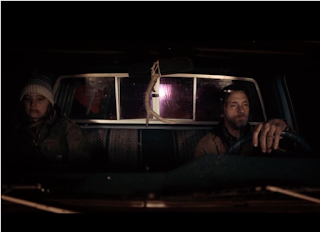“The director is the
most important influence on a film” Compare how far your two chosen films
support this statement.
The two films I have selected for this question is Blade
Runner (1992 directors cut) and The Lady From Shanghai (1947) and the directors
in question are Ridley Scott and Orson Welles. The Auteur Theory is “create
your own visual style… let it be unique for yourself and yet identifiable for
others.” Orson Welles.
The Lady From Shanghai was made in 1947 by Orson Welles
starring himself and Rita Hayworth. This film was originally made to get Welles
out of Debt because he went over budget for a stage production of around the
world in 80 days and he owed IRS Money. The film had a budget of 2.5 million in
which Welles went overbudget due to shotting in far locations such as Nicargarua
and San Fransisco , increasing costs on
travel and accommodation. Welles wanted full control of the film and had his
actress Rita Hayworth hair bleached and cut, which angered Harry Cohn, the
manager of Columbia pictures.
Towards the end of the film, we see a mirror sequence that is
a signature of Welles’ auteur style. This sequence shows long shots displaying
the mirror technique. This is what Welles wanted but Columbia Pictures demanded
more close ups of Rita Hayworth as they believed she was the main attraction to
the film. These look odd during the sequence and look out of place. Also in
this sequence you can see that whenever Rita is on camera she is always
brightly lit, enforcing the idea that the studio loved her. This gives a
Disorientating affect, as everything doesn’t make sense at this point in the
story as we just learnt who the killer was. This emphasises the classic Noir
style. We see Rita be revealed as the Femme Fatale which is convention
continuously used in the genre.
The influence the studio had over the Lady From Shanghai is similar
to the Influence of Warner Brothers on Ridleys Scotts Blade Runner. Throughout
the film, Scotts dropped signatures from his Auteur style such as Establishing
shots showing the location of the film, similar to Welles. He also uses Rain
which is inspired from his upbringing when he lived in the north of England.
This caused a problem with both cast and crew, Harrison Ford saying “ It was a
B*tch to film, The shooting was long and hard.” Ridley also painted Rachels
lips himself as he wanted them to be perfect.
The final scene in the
film sees the confrontation of Deckard and Rot and it ends with the men sitting
together in the rain, showing Scotts signature style. This shows a dark tone
and keeps the film grounded in the new noir style. The sequence has shot reversed
close ups of the two which is similar to the Lady from Shanghai but these shots
were intended. The monologue Tears in the rain was written and performed by
Rutger HAuer himself and Scott allowed that to be put in place. However, with
the original, The studio believed the film didn’t make much sense so they asked
Scott to put in a Harrison Ford voiceover throughout it. After the film came
out, this was seen as pointless and was taken out for the directors cut. Scott
had a lot of problems with the studio while making the film, eventually get
fired and rehired during the process. The film was meant to be under two hours
but the first copy they sent to the studio was four hours long which angered
Warner Brothers. This meant new scenes had to be shot causing this film to also
go overbudget like Welles The Lady From Shanghai.
In The Lady \From
Shanghai, Welles liked to have everything in focus and you could see that
throughout the film,making the film fell quite crampted at times when four men
were confined to single shot so they were all in focus. As well as having low
key and high key lighting in his shots as one of his signatures was having
composition between the two colours in every shot meaning he had layers of
shadow and light throught the scene causing silhouettes and shadows.
This differs to Blade
Runner as Scott wanted low key lighting always with little neon elements to
light up the scene as he wanted to create a wet and dark atmosphere as that was
one of his signatures of his auteur style. This is seen in the scene I mentioned
earlier and it gives the film a bleak tone as if nothing will get better. Before
taking on the film Blade Runner, Ridleys Scott’s brother Frank sadly passed away
due to his battle with cancer so this idea of the replicants running out of
time was really emphasised by Scott’s personal loss as he thought his brother
had ran out of time as well. Scott also added the unicorn scene to the
Directors cut as he wanted to symbolise the power of memories and how important
they were to the story. Deckard has a dream about a unicorn which shows human
nature which contrasts to the robotic feel of the film. It humanises Deckard as
he is more of your anti-hero type protagonist as he only kills the women
replicants, gets saved by Rachel by one of the male replicants, drinks a lot
and rapes Rachel.

Comments
Post a Comment